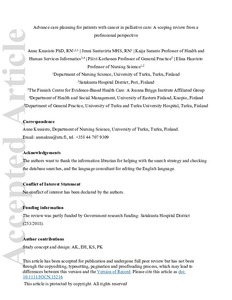Advance care planning for patients with cancer in palliative care: A scoping review from a professional perspective
Kuusisto Anne; Santavirta Jenni; Saranto Kaija; Korhonen Päivi; Haavisto Elina
https://urn.fi/URN:NBN:fi-fe2021042825941
Tiivistelmä
Aims and objectives
To describe advance care planning (ACP) for patients with cancer in palliative care from professionals' perspective.Background The number of patients with cancer is increasing. Palliative care should be based on timely ACP so that patients receive the care they prefer.
Design
A scoping review.
Methods
A systematic literature search was conducted in January 2019. The Preferred Reporting Items for Systematic Reviews and Meta-Analyses (PRISMA) checklist was used. The methodological quality of the studies was evaluated using the Joanna Briggs Institute (JBI) Critical Appraisal tools. Data were analysed with content analysis.
Results
Of 739 studies identified, 12 were eligible for inclusion. The settings were inpatient and outpatient facilities in special and primary care including oncology, palliative and hospice care. ACP consisted of patient-oriented issues, current and future treatment, and end-of-life matters. The participants were nursing, medical or social professionals. ACP conversations rarely occurred; if they did, they took place at the onset, throughout and late in the cancer.
Conclusions
Professionals could not separate day-to-day care planning and ACP. ACP documentation was scattered and difficult to find and use. Professionals were unfamiliar with ACP, and established practices were lacking. ACP conversations mostly occurred in late cancer. Further research clarifying concepts and exploring the significance of ACP for patients and relatives is recommended.
Relevance to clinical practice
Our results support the use of ACP by a multidisciplinary team from the early stages of cancer as a discussion forum around patients' wishes and choices. We showed the need to raise professionals' awareness of ACP. Education and appropriate data tools for ACP are important as they may reduce reluctance and promote ACP use. This paper contributes to the wider global clinical community by pointing out the importance of standardising ACP contents and practices.
Kokoelmat
- Rinnakkaistallenteet [29335]
